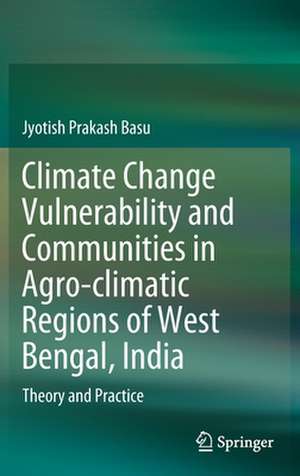Climate Change Vulnerability and Communities in Agro-climatic Regions of West Bengal, India: Theory and Practice
Autor Jyotish Prakash Basuen Limba Engleză Hardback – 20 iun 2020
The book particularly highlights the role of Indian governmental policies like Sarva Shiksa Abhiyan, Mahatma Gandhi National Rural Employment Guarantee Act (MGNREGA), the housing scheme, Indira Awas Yojana, the Food for Work Programme, and the rural road building scheme, Pradhan Mantri Grameen Sadak Yojana, which are important for rural development and in reducing vulnerability. Showcasing vulnerability measurement in the socio-ecological system, the book will appeal to developmental practitioners, government implementation agencies, policymakers and researchers in the field of environmental science and policymakers will find this book appealing.
| Toate formatele și edițiile | Preț | Express |
|---|---|---|
| Paperback (1) | 635.31 lei 43-57 zile | |
| Springer International Publishing – 21 iun 2021 | 635.31 lei 43-57 zile | |
| Hardback (1) | 641.53 lei 43-57 zile | |
| Springer International Publishing – 20 iun 2020 | 641.53 lei 43-57 zile |
Preț: 641.53 lei
Preț vechi: 754.74 lei
-15% Nou
Puncte Express: 962
Preț estimativ în valută:
122.80€ • 133.43$ • 103.21£
122.80€ • 133.43$ • 103.21£
Carte tipărită la comandă
Livrare economică 21 aprilie-05 mai
Preluare comenzi: 021 569.72.76
Specificații
ISBN-13: 9783030504670
ISBN-10: 3030504670
Pagini: 177
Ilustrații: XII, 177 p. 54 illus., 53 illus. in color.
Dimensiuni: 155 x 235 mm
Greutate: 0.45 kg
Ediția:1st ed. 2021
Editura: Springer International Publishing
Colecția Springer
Locul publicării:Cham, Switzerland
ISBN-10: 3030504670
Pagini: 177
Ilustrații: XII, 177 p. 54 illus., 53 illus. in color.
Dimensiuni: 155 x 235 mm
Greutate: 0.45 kg
Ediția:1st ed. 2021
Editura: Springer International Publishing
Colecția Springer
Locul publicării:Cham, Switzerland
Cuprins
1. Introduction.- 2. Review of Literature.- 3. Data Base and Methodology.- 4. Profile of Study Area & Socioeconomic Analysis of Sample Households.- 5. Quantitative Measurement of District Level Vulnerability in West Bengal Based on Secondary Data.- 6. Vulnerability of Households and Factors Affecting Vulnerability in Different Agro climatic Regions of West Bengal.- 7. Measurement of Vulnerability of Occupational Group of Households in different Agro Climatic Regions of West Bengal.- 8. Gender-wise Vulnerability in Different Agro-climatic Regions of West Bengal.- 9. Adaptation Strategy of the Households Across Five Agro-climatic Regions of West Bengal.- 10. Conclusions and Policy Recommendations.
Notă biografică
Dr. Jyotish Prakash Basu is a Professor and Head of the Department of Economics at West Bengal State University in Kolkata, India. His research focuses include agricultural economics, environmental economics and forest economics. He is currently researching the economic, social and environmental dimensions of climate change adaptation, ecosystem services, forest resource management, non-timber forest products, sustainable development and food security of forest dependent people.
Textul de pe ultima copertă
This book addresses the quantitative measurement of climate change vulnerability at the macro and micro-level and identifies household adaptation strategies to cope with the adverse effects of climate change. Focusing on five different agro-climatic regions of West Bengal: the hill region, foothill region, drought region, and coastal regions of Sunderban and Purba Midnapore, it presents research related to various sectors, including the agricultural, forestry and informal sectors. The book also offers insights into the impact of climate change on smallholdings, forest-dependent communities, fishing and crab collecting communities, casual labourers and workers in the informal sectors, and identifies the key vulnerabilities associated with climate change, as well as the causes of such vulnerability the extent to which remedial measures have been taken.
The book particularly highlights the role of Indian governmental policies like Sarva Shiksa Abhiyan, Mahatma Gandhi National Rural Employment Guarantee Act (MGNREGA), the housing scheme, Indira Awas Yojana, the Food for Work Programme, and the rural road building scheme, Pradhan Mantri Grameen Sadak Yojana, which are important for rural development and in reducing vulnerability. Showcasing vulnerability measurement in the socio-ecological system, the book will appeal to developmental practitioners, government implementation agencies, policymakers and researchers in the field of environmental science and policymakers will find this book appealing.
The book particularly highlights the role of Indian governmental policies like Sarva Shiksa Abhiyan, Mahatma Gandhi National Rural Employment Guarantee Act (MGNREGA), the housing scheme, Indira Awas Yojana, the Food for Work Programme, and the rural road building scheme, Pradhan Mantri Grameen Sadak Yojana, which are important for rural development and in reducing vulnerability. Showcasing vulnerability measurement in the socio-ecological system, the book will appeal to developmental practitioners, government implementation agencies, policymakers and researchers in the field of environmental science and policymakers will find this book appealing.
Caracteristici
Provides insights into the role of Indian governmental policies Discusses micro and macro-level quantitative measurement of climate change vulnerability Offers insights into the impact of climate change on smallholdings, forest-dependent communities, fishing and crab collecting communities
